Special report: How Covid-19 pandemic has widened sport’s gender gap
Since the Covid-19 pandemic started sport across the world has been faced with havoc, but none more so than women’s sport which has been pushed to the margins.
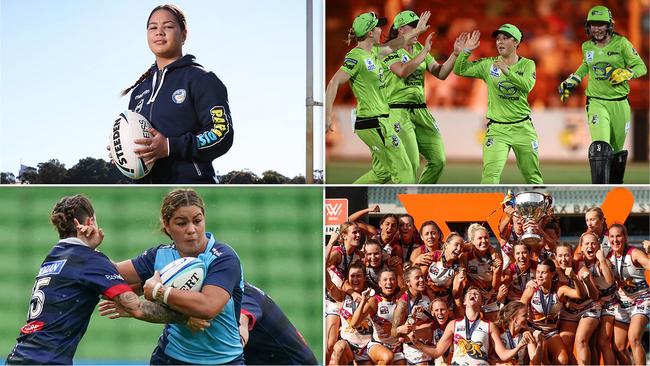
Rugby
Don't miss out on the headlines from Rugby. Followed categories will be added to My News.
Dual-code star Kennedy Cherrington is working as a labourer, has a second job helping disabled children and studies full-time.
In between all this she plays in the Super W rugby competition and the NRLW tournament, and like thousands of other female athletes the 22-year-old could not survive without her part-time jobs.
Since Covid-19, sport across the world has faced havoc, none more so than women’s sport which has been pushed to the margins.
And a few, in particular, have not fought to save games with the same vigour as the men’s — including rugby league’s NRLW — the unwanted poster child of sports’ gender gap.
The NRL cancelled this year’s tournament at late notice, and did not ask the Queensland government whether a hub could be set up for the players as they did for the men.
They are not alone.
Catch all the ICC T20 World Cup action live & exclusive to Fox Cricket, available on Kayo. New to Kayo? Start your free trial today.
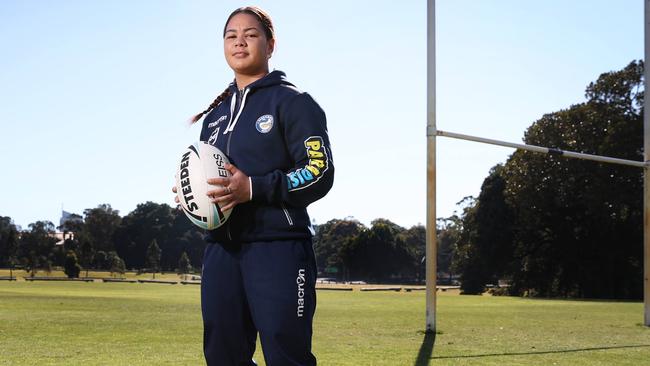
Rugby Australia hastily arranged a Super W tournament over two weeks in Coffs Harbour, and even that was tainted when Western Force had to return to Perth after just one match due to border closures.
“With women’s sport in general, we’re not full-time in our organisation’s eyes,” said Cherrington, who plays for NSW Waratahs and is signed with Parramatta Eels for next year’s back-to-back NRLW tournaments.
“We’re full-time in our eyes, but we’ve still got to work, pay bills, look after kids, look after our families, and we don’t get paid enough to survive just on playing footy even though we’re probably training just as much as the opposite gender. I know some girls working three part-time or casual jobs just to balance.
“The young ones are working casual or part-time and studying – we can’t get a full-time job because it doesn’t allow the flexibility to train for games and being on tour.”
Cricket and football suffered greatly given overseas travel restrictions, with 13 Matildas games and eight Socceroos matches cancelled.
However, both sports benefited on the domestic front as summer sports, with the A-League and W-League, as well as the men’s and women’s Big Bash leagues, suffering less from restrictions as the virus raged largely in winter months.
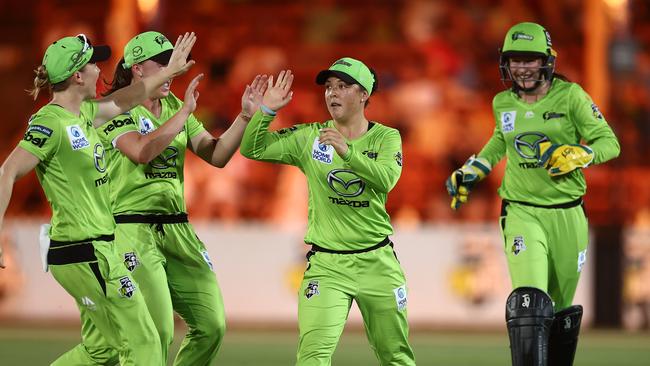
The Women’s National Cricket League was cancelled, as were four men’s Sheffield Shield games.
The AFLW cancelled their 2020 finals series after firstly shortening the competition, playing in empty stadiums, and reworking the playoff system. No premiership was awarded.
This year they successfully managed to stage the entire tournament before the Delta variant forced restrictions throughout Australia and the Brisbane Lions won the grand final in April.
It was not so for rugby union and league, who had planned their tournaments mid-year.
Australia’s national women’s rugby team, the Wallaroos, have not played a match since August 2019, while the contracted Super W competition and lack of games led to players like Cherrington exploring the rival code.
“Tiana Penitani had asked me to come to league,” Cherrington said of her dual-code friend.
“I thought I might as well give it a crack, there wasn’t much footy happening and league was going ahead when rugby union wasn’t.”
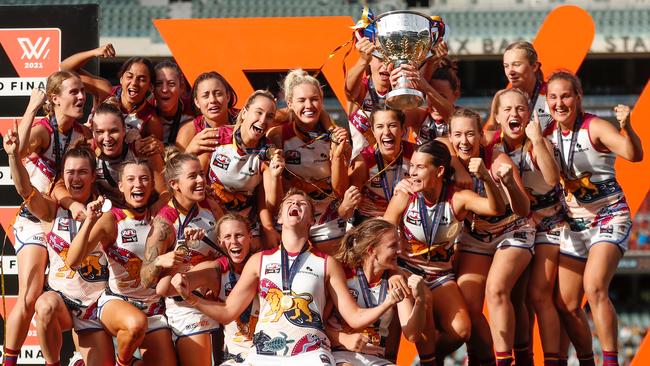
However, league’s female fraternity have been up in arms over the NRL’s handling of this year’s botched tournament, all while they plan the introduction of a new men’s team in Queensland in 2023.
NRLW player and media personality Katie Brown said: “It’s incredibly frustrating when you think, bring in a 17th NRL club, you don’t get an extra game, you get a bye, and you have women getting compensated $3500 and you’re pulling back on even paying that.
“You actively boast about equality and the Women In League round and then you blame the pandemic for postponing the competition three times and then it comes out you lied and never even applied for the women to go up to Queensland.
“It’s confusing, it’s deflating.
“This is not going to get better until there’s an NRLW board that has the priority of growing the women’s game, has a commercial team who are out there actively out there to back the women’s game.
“You should be questioning your sponsors here. If you’re signing sponsors, why aren’t they putting money into the women’s game? It should be compulsory, and if that sponsor doesn’t want to put money into the women’s game then you shouldn’t want that sponsor because they’re not promoting equality.”
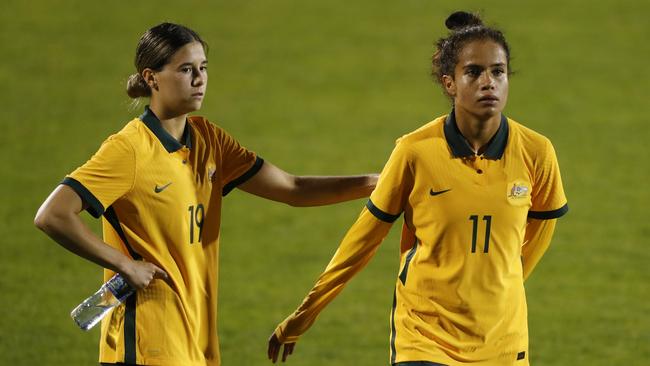
NRL chief Andrew Abdo said recently the late call to cancel this year’s tournament, leaving eight New Zealand players stuck in Queensland without pay, was because “we were throwing everything at it — the whole kitchen sink, we were looking at all ways for this to work”.
“You can only put an application in with specific individuals, their names, their addresses, where they live, etc,” Abdo said.
“So the first step was how many people could go on that application. And the RLPA poll response we got back was only up to 70 per cent.
“It’s not feasible. That’s three and a half teams, we can’t have a competition. We would have needed a full squad (for each team).”
Female players said once they understood the ramifications they attempted to retake the RLPA poll but were rejected.
But some believe the pandemic has actually shown the giant strides made by women’s sport.
Sarah Styles, director of the Office for Women in Sport and Recreation in Victoria, has been buoyed by the response from various sports.
“Think about where we are today, versus if this pandemic had happened five years ago,” Styles said.
“If it had happened five years ago, the likelihood that leagues around the country would’ve just been parked and put on the shelf would be far greater.
“Yes, there have been decisions that are less than ideal, but what we’ve also seen is so many examples where sporting codes have actually shown how embedded in their DNA the promotion of women’s sport – and making sure women’s sport happens – actually now is.
“Covid has shown this is fundamentally part of sports business, it hasn’t been cast aside as window dressing.”
Styles said a mandate in 2017 requiring more than 100 sporting bodies across Victoria to have at least 40 per cent of their board members female has had 95 per cent compliance since 2019.
But she does have concerns about the number of jobs lost during Covid that were primarily in the women’s field.
“The skeleton staff that women’s leagues often run on is a real issue,” Styles said.
“There’s something in here around ensuring women’s leagues are appropriately resourced, or having that embedded culture of people seeing that the men’s and women’s leagues are what they all do, so by scale you’ve effectively got the whole organisation working for you.
“When you have seen sports contract, you’ve seen people who are dedicated to women’s roles lose their jobs, and then perhaps people who were in roles in the men’s path way pick up these women’s role as a part of their job.
“There is going to be a risk here that the people with deep expertise, particularly around high performance, they’ve missed these opportunities.”
Originally published as Special report: How Covid-19 pandemic has widened sport’s gender gap



